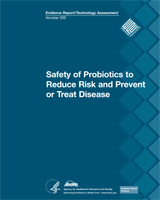NCBI Bookshelf. A service of the National Library of Medicine, National Institutes of Health.
Hempel S, Newberry S, Ruelaz A, et al. Safety of Probiotics to Reduce Risk and Prevent or Treat Disease. Rockville (MD): Agency for Healthcare Research and Quality (US); 2011 Apr. (Evidence Reports/Technology Assessments, No. 200.)
This publication is provided for historical reference only and the information may be out of date.
Despite a substantial number of publications on probiotics little evidence is available to answer specific questions regarding their safety in research studies. RCTs and case studies diverge in the outcomes they report, there is a lack of assessment and structured reporting of adverse events, and interventions are poorly documented. The available evidence in RCTs does not indicate an increased risk; however, rare adverse events are difficult to assess and the current literature is not well equipped to answer specific questions on the safety of probiotics in intervention studies with confidence. To quantify potential health risks the presence and absence of adverse events should be reported, adverse events should be monitored (particularly in health-compromised participants), infections due to the administered organisms and treatment failures should be documented; and the effect of delivery vehicles should be assessed systematically. In addition, few studies currently exist that report on effects in the elderly, the long-term effects of probiotics use, or on interventions based on genera other than Lactobacillus. These limitations hinder conclusions regarding the safety of probiotics used to reduce risk and prevent or treat disease.
- Conclusions - Safety of Probiotics to Reduce Risk and Prevent or Treat DiseaseConclusions - Safety of Probiotics to Reduce Risk and Prevent or Treat Disease
- PREDICTED: Xenopus laevis transformer 2 alpha homolog S homeolog (tra2a.S), tran...PREDICTED: Xenopus laevis transformer 2 alpha homolog S homeolog (tra2a.S), transcript variant X6, mRNAgi|2038238027|ref|XM_018242272.2|Nucleotide
- transformer 2 alpha homolog S homeolog isoform X2 [Xenopus laevis]transformer 2 alpha homolog S homeolog isoform X2 [Xenopus laevis]gi|1069308123|ref|XP_018097757.1|Protein
- Mus musculus zinc finger protein 661 (Zfp661), transcript variant 4, mRNAMus musculus zinc finger protein 661 (Zfp661), transcript variant 4, mRNAgi|1244518122|ref|NM_001355623.1|Nucleotide
- Allogalathea elegans voucher OGL-E01297 cytochrome oxidase subunit 1 (COI) gene,...Allogalathea elegans voucher OGL-E01297 cytochrome oxidase subunit 1 (COI) gene, partial cds; mitochondrialgi|323321972|gnl|uoguelph|OGLA404-1 -5P|gb|HQ967799.1|Nucleotide
Your browsing activity is empty.
Activity recording is turned off.
See more...
